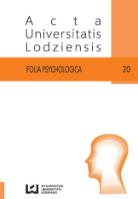Trzy generacje terapii poznawczo-behawioralnych – rozwój i założenia teoretyczne
Three Waves of Cognitive Behavior Therapy – Developmental and Theoretical Assumptions
Author(s): Andrzej ŚliwerskiSubject(s): Psychology, Cognitive Psychology, Behaviorism, Health and medicine and law
Published by: Wydawnictwo Uniwersytetu Łódzkiego
Keywords: cognitive behavior therapy; waves of cognitive behavior theories; mindfulness based theories;
Summary/Abstract: Cognitive behavior theories are among the youngest paradigms in clinical psychology. They are subjected to constant modifications, which raises a lot of misunderstandings and misinterpretations. Some authors argue that this concept is inconsistent and personality traits recede into the background. They claim that cognitive theory is more the psychology of behavior, cognitive processes and structures than the psychology of human being (Sęk, 2005). The history of cognitive ideas development allows us to understand their assumptions, their current place in psychopathology, and the current state of knowledge. The division into the so-called three “waves” of the cognitive behavior theories renders it possible to separate stereotypes about this theory from its proper image. The article describes the current state of the cognitive behavior theories, with account given to the latest generation, which includes: Mindfulness Based Cognitive Therapy (MBCT), Acceptance and Commitment Therapy (ACT) as well as Schema Focused Therapy (SFT).
Journal: Acta Universitatis Lodziensis. Folia Psychologica
- Issue Year: 2016
- Issue No: 20
- Page Range: 5-30
- Page Count: 26
- Language: Polish

